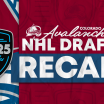The International Ice Hockey Federation's Historical Committee announced the 20th class to be inducted to the IIHF Hall of Fame on Tuesday.
Former Avalanche players Joe Sakic, Uwe Krupp and Teemu Selanne, along with Saku Koivu, Angela Ruggiero and builder Dieter Kalt, will be granted the honor at the 2017 IIHF Hall of Fame Induction Ceremony, which will take place in Cologne, Germany, on May 21, the final day of the 2017 IIHF Ice Hockey World Championship.
Sakic, Krupp Among Those Named To IIHF Hall Of Fame

© Dave Sandford/Getty Images
By
ColoradoAvalanche.com @Avalanche / ColoradoAvalanche.com
From the IIHF Hall of Fame release:
Joe SakicBurnaby, British Columbia, Canada, 7 July 1969
The 12th member of the IIHF's Triple Gold Club, Joe Sakic was a winner from the beginning of his career to the end. A leader and gentleman, he also possessed the most effective wrist shot in the game and was admired and respected by teammates and opponents equally.
Sakic started his NHL career in 1988 after being drafted 15th overall by Quebec the previous year. The team had wanted him to play right away, but he insisted on taking another year in the WHL with Swift Current, during which time he helped Canada win gold at the 1988 World Junior Championship in Moscow. At season's end, he was named the best junior player in Canada.
He quickly established himself as a powerful forward whose quick release made his shot so effective. He scored 23 goals as a rookie and a year later, he eclipsed the 100-point plateau for the first of six times in his career.
What was also obvious to all who knew him was his quiet leadership abilities. Not a screamer by nature, he nonetheless inspired those around him to raise their level of play when it mattered most. Fiercely competitive yet even-tempered, he was a leader in the Steve Yzerman mold, and in 1992 Sakic was named captain of the Nordiques. He would wear the "C" for the next 17 years of the franchise's history.
Sakic played in two World Championships early in his NHL career, winning silver in 1991 and gold three years later, the first for Canada since 1961. The Nordiques, however, moved to Colorado in 1995, and in the first season won the Stanley Cup. That was a career year for "Gentleman Joe," who had 51 goals, 69 assists, and a career high 120 points. In the playoffs, he scored the winning goal in six of the team's 16 wins and was named the Conn Smythe Trophy winner.
The Avalanche won the Cup again in 2001, but it was a gesture by Sakic in celebration that remains in the mind's eye. Instead of raising the Cup high over head, as is tradition for the Cup-winning captain to do, Sakic swooped the trophy low and handed it to Ray Bourque, the former Boston Bruins defenceman who had never been able to win the trophy with the Bruins in nearly two decades.
Sakic was also part of Canada's historic 2002 Olympic team that won gold for the first time in half a century. He scored a pivotal goal in the gold-medal game and was named tournament MVP for his brilliant play in Salt Lake City. He won the World Cup in 2004 with Canada and two years later captained his country at the Turin Olympics in Italy.
By the time he retired in 2009, Sakic had won everything there is to win. His NHL statistics were staggering: 1,378 games played, 625 goals and 1,106 assists. He had his No. 19 retired by the Avs the year he retired and was inducted into the Hockey Hall of Fame in 2012.
Sportsman, victor, leader, Joe Sakic was one of the game's legends.
#
Uwe KruppCologne, West Germany (Germany), 24 June 1965
It's difficult enough making an impact at the top levels of hockey, but it is doubly so for players outside the "Big Six," because their chances of crafting an impressive resume through medals is greatly diminished.
Yet it is easy to name Uwe Krupp as the finest hockey player Germany has ever produced. A defenceman of imposing size, he was nevertheless a fluid skater who brought the puck out of his zone with fluid consistency.
As a result, legendary coach Scotty Bowman wasn't disappointed that Krupp failed to register a point at the 1983 World Junior Championship. And he wasn't disappointed that Krupp's offensive production with Kolner Haie was similarly low. Bowman saw behind the numbers, and while GM of the Buffalo Sabres selected Krupp 214th overall at the 1983 draft.
Krupp stayed in Germany for three more seasons, but in 1986, after a brief but impressive showing at the World Championship, he was ready to try his hand at the pro level in North America. Although he played several games with the Sabres that year he spent most of the 1986-87 season in Rochester where he helped the Americans win the Calder Cup. After that, Krupp was an NHLer for the next 14 seasons, making history for himself and for Germany.
At 198 cm (6'6") tall, he was the tallest player in the league for several seasons, but, impressively, mobility was never his weakness. Krupp played for the Sabres for the better part of six seasons before being traded to the New York Islanders where he continued to develop his offensive skills.
It was at the 1994 draft that Krupp's career took a turn that would change his life. He was traded to the Quebec Nordiques with a first-round draft choice for Ron Sutter and a first-rounder. Just one year later, the Nordiques, a Stanley Cup contender, moved from Quebec to Denver, Colorado. The team reached its zenith by advancing to the Cup finals against Florida, an expansion team making its first appearance in the finals.
The Avalanche won the first three games by scores of 3-1, 8-1, and 3-2, but game four was goalless through 60 minutes of regulation time. The fourth period and fifth period were also played without a goal, but at 4:31 of the sixth period Krupp scored to give the Avs the Cup and cement his own legacy. He was the first German to score a Cup-winning goal and the first German to win the Cup.
In addition to a brief appearance at the 1998 Olympics, Krupp was part of another Cup-winning team under Bowman, this time in Detroit in 2002. By this time back injuries had severely compromised his career, and he retired soon after.
Krupp later returned to Germany to coach the junior and senior teams, leading the national program from the 2006 Olympics through the 2011 World Championship. He started as a German pioneer in the NHL, made history during his career in North America and returned home to teach a new generation of players what he had learned.
Teemu SelanneHelsinki, Finland, 3 July 1970
Gordie Howe is known as Mr. Hockey. Glenn Hall is called Mr. Goalie. It is only right, therefore, to refer to Teemu Selanne as Mr. Olympics, for no hockey player has ever appeared in the Olympic Winter Games as many times as the six appearances by arguably the greatest hockey player ever to come out of Finland.
Although he was drafted by the Winnipeg Jets in 1988, fans had to wait four years before he made his NHL debut. In the interim, he played at every top international tournament possible, from the World Juniors in 1989 in Alaska, to the 1991 World Championship, 1991 Canada Cup, and 1992 Olympics in Albertville, where the 21-year-old tied for the goalscoring lead with seven.
Making his NHL debut in October 1992 as a 22-year-old, Selanne played with a maturity far beyond any other first year player. By the time the season was over he had scored a staggering 76 goals and 132 points, both records for a rookie which might never be broken. He was, of course, awarded the Calder Trophy, and although he never reached those lofty heights again he did establish a level of consistently high play that made him an elite player.
Selanne was called the "Finnish Flash" because of his breakaway speed, but he had a fantastic shot as well. Once he created an opening with his skating, he was more than able to finish the play with a wicked blast.
Despite his status, though, the Jets traded him to Anaheim in a deal that brought young players Chad Kilger and Oleg Tverdovski to the Jets. It was a deal Winnipeg fans had a tough time accepting, and an inspired Selanne responded with consecutive 50-goal seasons with the Ducks.
Selanne played in his second Olympics in 1998 when Finland beat Canada to win the bronze medal. A year later, the Finns lost in overtime to miss out on a World Championship gold medal, settling for silver.
Like all superstars, Selanne was not only highly skilled--he was incredibly consistent at this high level. He scored 684 goals in 21 NHL seasons, three times surpassing 50 in a season. In 1998-99, he won the "Rocket" Richard Trophy with 47 goals, tops in the league. In all, he recorded 1,457 total points in 1,451 regular-season games.
Despite the numbers and personal success, though, his greatest memory of NHL play was the 2006-07 season when he helped the Ducks to their first, and only, Stanley Cup.
Ultimately, though, it was his storied career with Suomi that fans remember. Selanne donned the blue and white one last time, in Sochi in 2014 at age 43. There he played so well while leading the Finns to a bronze medal that he was named tournament MVP. He retired as the all-time record holder in Olympic hockey for total points (43).


















